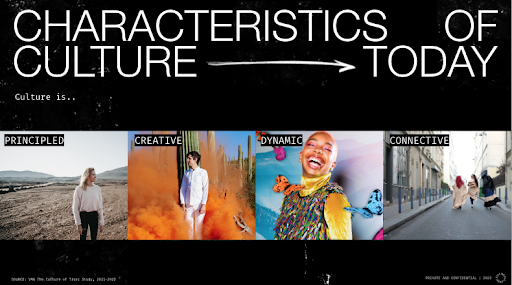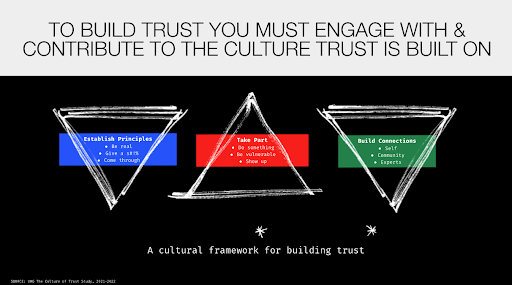Trust is under fire across a variety of contexts: in the news, in our relationships, in our leaders and our belief in brands, and especially for Gen Z, whose bullshit detector is on high alert.
Developing and maintaining trust is a formidable challenge and especially with younger generations. Yet, there is a way to think of trust building – through culture, by contributing to culture and by displaying this generation’s shared values, beliefs, behaviours and needs.
A New Radical Framework for Trust Building
While the market is saturated with trust studies and rankings of favourable companies, all are frequently underpinned by opaque methodologies and algorithms to tell us which users, companies and news outlets are trustworthy and which are not. Very few have stopped to show us who is trustworthy and why they’re trustworthy.
VICE Insights partnered with Presciant, a consultancy with experience in researching the source of building brand trust and value, to dive deep into the behaviours of the most successful trust building companies and test our hypothesis with 6,056 global respondents spanning Gen Z & Y.
What we discovered is that the most successful trust-building companies demonstrate a contribution to the shared fabric of modern culture, the foundational pillars that guide us, unite us and move us forward.
Trust Is Built In Culture
“Culture is everything. Culture is how you live, you breathe, your thoughts, your values, and your state of mind. It’s what moves people. It’s what creates art and music. It’s what drives people. It makes people feel alive. Trust is at the center of culture, and culture is at the center of trust.” -Youth Expert Interview
Culture has a profound impact on trust. Culture is not only a lens through which to view ourselves but through which we view others and evaluate trustworthiness. Our research called attention to the underpinning characteristics linking cultural understanding between groups and fostering those bonds of trust, and cultural characteristics that can act as benchmarks for brands to evaluate their trust standing.
Four Core Cultural Characteristics
Culture is an all-encompassing word and certainly varied by social context, situations and geography. Yet, four critical characteristics of today’s culture united our global youth respondents, and these are crucial to the trust-building processes: principles, creativity, dynamism and connection.

Today’s culture is principled. Youth continue to recognize themselves as activists and strive towards better futures, such as equality, dignity, social consciousness and environmentalism. They expect others: family, friends, and corporations, to do the same.
Creativity fuels them today, equal parts innovation and salvation. Creativity has become fundamental to the lives and identity of Gen Z; 7 in 10 consider themselves to be really creative.
Culture is dynamic, and outdated notions of linearity have been broken down by youth. This has impacted multiple vectors of their lives, from approaches to education and wealth creation to navigating the world in a constant state of exploration and planning for change.
Underpinning our cultural fabric is connection. Relationships will and have always been a guide to trust. What’s evolving is where the most trusted relationships and sources are coming from. Young people trust their instincts above others, their communities, and their loved ones and seek expertise over likes and follower counts to guide them through their journeys.
Brands Must Contribute to Culture To Build Trust, Simple Right?
Whether you’re a multinational corporation or a startup, to be “trustworthy” you need to adopt these four cultural characteristics in a meaningful way and commit to upholding them.
Look to companies like Nike to see these characteristics are inherent to how the brand behaves. Its message of inspiration flows throughout its brand DNA, communications and activities. They embrace today’s shifting and inclusive culture by letting those who represent it (e.g. athletes, experts, activists, real people, etc.) carry the message forward. They not only support inclusive organizations and give charitably, but they use their innovation to push boundaries and move the culture forward. They were one of the first brands to provide direct access to experts (in fitness) on mobile apps, capturing the desire of young people to learn from the best. Nike consistently tops the lists of companies brands Gen Z trust the most because they contribute to culture in profound and varied ways.
Patagonia has always stood by its principles and higher purpose of helping the environment. Annually, they top the Fashion Revolution Transparency Index, which measures how brands implement sustainable policies in the value chain, hold themselves accountable, and evaluate their environmental impact objectives. Many were impressed when Founder Yvon Chouinard forfeited ownership of the company he founded 49 years ago by giving the entire company to a uniquely structured trust and non-profit, with a single shareholder – planet Earth. “As of now, Earth is our only shareholder,” the company announced. “ALL profits, in perpetuity, will go to our mission to ‘save our home planet’.”
As he re-routes profits to fight climate change, his principles and consistent environmental stance will inspire generations to come. Patagonia’s contribution to culture is the reason it retains its identity to Gen Z as a brand to buy.
The Challenge is you cannot game the system.
We so often hear from brands with a campaign mentality or a sustainability initiative they want to launch for a quarter. But to Gen Z those mean nothing if brands don’t put in the work. Brands need to “show up” and contribute long-term to the cultural fabric underpinning Gen Z lives. Trust is about every aspect of your business. It’s not just about what you say or how you say it. It’s everything from how you source your products to how you treat your employees and customers. Culture doesn’t stop when a campaign ends.
Moving from WHY to HOW
We know gaining and keeping trust is not easy. In response we developed a workshop tool that allows companies to evaluate their place and space in culture, benchmark their brand against the ‘best trust builders’ and prioritise actions to increase trust, and grow appeal and business with Gen Z.

The most challenging part of this study is bringing it to life within your own walls.
If you’d like to work with our radical new cultural framework for trust building – get in touch and email us at insights@vice.com.



